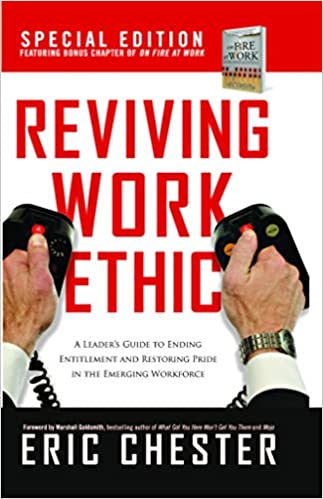Reviving Work Ethic – Eric Chester

“Reviving Work Ethic” includes real-life examples, anecdotes, and practical advice for employers, employees, and educators on how to cultivate a strong work ethic in the workplace and in society. It is a useful resource for anyone interested in improving their work ethic and achieving success in their career.
The Importance of Work Ethic
Work ethic is essential for success in any profession or career. It is what separates the best employees from those who simply show up and go through the motions. Having a strong work ethic means being reliable, responsible, and taking pride in one’s work.
The Benefits of a Strong Work Ethic
A strong work ethic has many benefits, both for individuals and for society as a whole. It can lead to greater job satisfaction, higher productivity, improved relationships with colleagues and customers, and increased chances of career advancement.
The Importance of Work-Life Balance
Work-life balance is essential for maintaining a strong work ethic. Employers need to create a culture that values work-life balance, while employees need to prioritize their health and well-being outside of work to avoid burnout.
How to Revive Work Ethic
Reviving work ethic requires a concerted effort from individuals, employers, educators, and society as a whole. This involves identifying and addressing the root causes of the decline in work ethic, fostering a culture of hard work and personal responsibility, and recognizing and rewarding those who embody these values.
The Importance of Communication in Building Work Ethic
Clear communication is key to building a strong work ethic in the workplace. Employers need to communicate their expectations clearly and consistently, and employees need to be encouraged to ask questions and seek clarification when needed.
The Factors that Influence Work Ethic
Work ethic is influenced by a range of factors, including upbringing, education, personal values, and societal norms. Understanding these factors can help employers and individuals identify and address any gaps in their work ethic.
The Role of Education in Building Work Ethic
Education plays a critical role in developing a strong work ethic in young people. Schools and colleges should focus not only on academic knowledge but also on developing important life skills such as time management, teamwork, and personal responsibility.
The Role of Technology in Building Work Ethic
Technology has had a profound impact on work ethics, both positively and negatively. While it can improve efficiency and productivity, it can also create distractions and temptations that can undermine work ethics.
The Decline of Work Ethic in America
Over the years, the work ethic in America has declined, with many workers now prioritizing leisure over work. This trend is a cause for concern, as it can lead to reduced productivity, increased absenteeism, and a decline in the overall quality of work.
The Role of Employers in Building Work Ethic
Employers play a crucial role in building a strong work ethic in their employees. This involves setting clear expectations, providing regular feedback, offering opportunities for growth and development, and recognizing and rewarding hard work.

